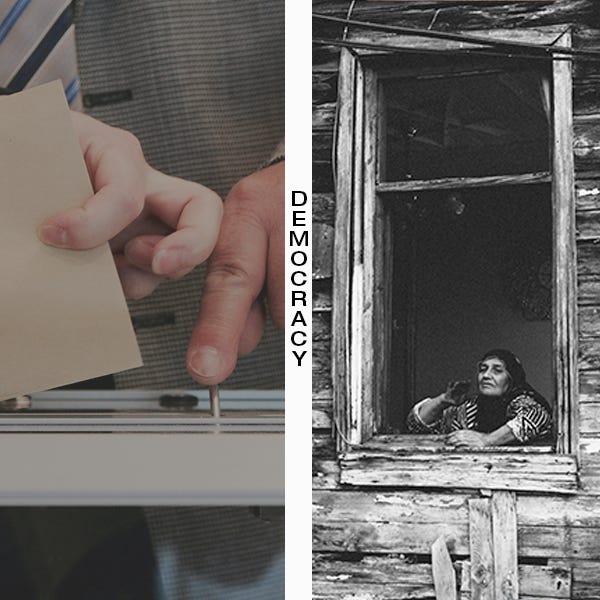The value of global real estate makes up nearly 60% of the value of all global assets, with residential real estate comprising 75% of the total. In a September referendum, which was the result of years of organizing, Berlin residents overwhelmingly voted that the Senate should “introduce all measures necessary for the transfer of real estate and land into common ownership, for the purpose of socialization under Article 15 of the Common Law”.
While the referendum is not legally binding, it is significant for working people in Berlin, and is likely to have repercussions across Germany, Europe, and the world.
Using the Berlin referendum vote to expropriate large-scale landlords as a reference, ELMO – Eastern European Left Media Outlet’s roundtable gathered activists from movements in Romania, Serbia, Hungary and Germany to discuss the engagement of the invited speakers’ movements in struggles for the right to housing, the potentials for transnational organizing to transform it, and to talk how internationalist left media could amplify the voices of movements and support the organizing efforts.
ELMO’s guests addressing the issues related to housing where Anisia Petcu and Andrei Belibou (Deutsche Wohnen & Co Enteigen, Berlin, Germany), Ana Vilenica (Radical Housing Journal, Serbia), Zsuzsi Pósfai (Periféria Policy and Research Center, Hungary), Mihail Dumitriu (The Common Front for Housing – FCDL, Bucharest, Romania). The event was moderated by Mary Taylor (LeftEast, ELMO).
The question is not ‘if’ but ‘when and how’
Berlin is a city of renters. Around 85% of the city’s population does not own their living space, hence the sharp increase in rent price affected the lives of a vast majority. This enabled the movement for affordable housing in Berlin to talk to and organize with a lot of people in the struggle to socialise apartments which mega-landlords – corporations owning large quantitates of housing stock – acquired for peanuts.
“We successfully organized a referendum which just passed with over a million votes and which said that people in the city would like all the mega-landlords to be expropriated and those houses to be socialised and put back to common use”, explained Anisia Petcu, a member of the Deutsche Wohnen & Co Enteignen, the campaign for the referendum in favour of the expropriation of big corporate landlords which started in 2018.
Berlin was known for its cheap rents, but in the past two decades financialization transformed housing in the city. Significant part of the state owned housing stock was privatised to the benefit of large corporations. Deutsche Wohnen, the biggest housing corporation operating in Berlin, bought 60.000 social housing apartments for as low as 7,500 euros per apartment.
The housing rights movement benefitted from the rich experience in political organizing in Berlin, further explained Petcu: “It is important to know that there is a strong history of organizing in the city and our movement started with the knowledge and the expertise of these people who had been organizing for a long time”.
The referendum also got some explicit political support. A major political party, The Left, supported the referendum and helped the campaign by collecting signatures. The other two major left leaning parties, the Greens and the Social-democratic Party, did not endorse the referendum, but a lot of their members expressed public support, said Andrei Belibou, a member of the Deutsche Wohnen & Co Enteignen campaign.
After the successful referendum Deutsche Wohnen & Co Enteignen is focusing its efforts on extending its grassroots reach. Having strong local presence is perceived by the campaign’s activists as key in order to make the referendum vote a reality. Members of the campaign are also making an effort to be present at all appearances of politicians to exert pressure. Meanwhile, politicians who are not in favour of restoring affordable housing in Berlin are seeking ways to minimize the impact of the referendum.
“The parties that are against the referendum decision cannot ignore the referendum because of the huge number of votes, but they are trying to frame it in terms of ‘if it’s possible’, ‘let’s talk about this’, while for us the question is not ‘if’ but ‘when, how and under what circumstances’”, said Anisia Petcu.
Could the Berlin referendum be a precedent for similar initiatives in Eastern European countries?
While Berlin is a city of renters, Serbia is a country of super-homeownership, remarked housing activist and urban researcher Ana Vilenica. As a consequence of the model of privatisation which was carried out in the 1990s and which is similar to the models used in other post-socialist countries, many people in Serbia are homeowners without being affluent. A growing number are losing or in danger of losing their homes as a consequence of indebtedness or inability to pay the bills.
Renters are estimated around 18% of the population, but there is no exact data to correct or support this estimate. Apartment renting constitutes a grey zone, since it is mostly done informally. Hence organizing renters does not lend itself as a potent field for housing movement activities.
There are indications that the the housing sector became a field for large-scale money laundering which could be an issue for the left in Serbia and Eastern Europe to address.
“The data that last year more than 80% of housing in Serbia has been bought for cash and the rise of prices are markers that point in the direction of large scale money laundering. The left is reluctant to touch the topic of corruption, since it is occupied by liberals, but I think that there is space for the left to address this issue”, pointed out Vilenica.
In order to assess whether the Berlin referendum can be a precedent for similar initiatives in Eastern European countries, we have to take into account a key difference in the ownership structure, said housing activist and founding member of Periféria Policy and Research Center in Hungary, Zsuzsi Pósfai. Large corporate landlords are the target of the struggle for affordable housing in Berlin while in Eastern Europe such institutional owners are absent. Those structural differences notwithstanding, the skills, tools and knowledge developed and used by the campaign organizers in Berlin is of huge value for housing movements in Eastern Europe, which can also benefit from other Eastern European movements’ experiences:
“The municipalist movements that are getting stronger in several cities in Eastern Europe exemplify the most of this kind of systematic organizing, door to door engagement with people, and that’s something that would be great in the housing movement as well.”
In Romania property is very fragmented. After 1990, similarly to Serbia, a nationwide privatisation of housing was undertaken and today 96% of the population resides in privately owned units. Large part of these housing units is overcrowded and owners live on below average income. The demand for public housing far exceeds the current stock which is around 2%, architect, scenographer, and housing rights activist Mihail Dumitriu told while explicating the specificities of the Romanian housing context.
He pointed out debt relations as an important problem regarding housing. “It is important to produce local knowledge, to understand the specific aspects of the housing markets and their relation with transnational capital. Housing should be removed from market relations”, commented Dumitriu.
What could be the role of a transnational leftist media network in housing struggles?
There is already a benefit in knowledge and information exchange among the left via leftist media, said Pósfai. Furthermore, leftist media outlets can play an important role in presenting leftist theoretical discourse and discussions in a language which is widely accessible. However, in Pósfai’s view, leftist media outlets face a difficult question of how to break out of a narrow, politically already affiliated audience bubble.
While discussing leftist media’s role in relation to the housing movement, Vilenica commented that leftist media established itself in relation to mainstream media on the basis of analysis. In her view, the time has come to move towards investigative journalism. Data acquired by journalistic research would benefit left wing movements.
Media outlets can inform on victories of the left. Such reports answer a need a lot of people share and they are inspiring and energizing. Getting information on what is possible is important, remarked Belibou.
“A big part of what media has been doing in relation to the Berlin referendum is just informing that it happened and that it is a victory in a housing struggle. It happened in Berlin, it is not everywhere, but still, it happened, which means that it can be done. I think the more we hear about victories and how they were achieved, the more victories we are going to get”.
“One of the biggest successes of the Berlin campaign was knowledge and skill sharing. The campaign organizers made sure that anyone who wanted to join would get the proper information, skills and knowledge. Journalists have the knowledge to communicate in an effective way and this kind of knowledge should be made available to everybody and shared with everybody so that it can become as decentralised as possible”, concluded Petcu.
The roundtable was held online on 6 November 2021. Check out the full discussion here.
Photo: A housing protest in Berlin (source:
This article was published as part of the cooperation of East Left Media Outlet (ELMO) – a group of left-leaning media from Central and Southeastern Europe.
The Barricade is an independent platform, which is supported financially by its readers. If you have enjoyed reading this article, support The Barricade’s existence! See how you can help – here!
Also, you can subscribe to our Patreon page. The Barricade also has a booming Telegram channel, a Twitter account and a YouTube channel, where all the podcasts are hosted. It can also be followed in Rumble, Spotify, SoundCloud and Instagram.











